
Meitan county is located on the subtropical Guizhou Plateau which lies south of the Yangtze River. The steep terrain that bounds the plateau is marked by massive craggy limestone boulders cut by fast-moving streams.
Tea is planted in the northern part of the plateau, about 70 kilometers from Zunyi (known as Guizhou’s tea city). Meitan county is 65% covered by a forest of conifers with oak and chestnut and a floor of figs, legumes, and ferns. Camellia trees, the genus that gives us tea, are native. Trees in steep basins cling to the Karst limestone amid caves, sinkholes, and underground rivers. The 37,333 hectares of tea growing there are surrounded by a beautiful ecological environment where the average temperature is 15℃ — rainfall averages 1,112 millimeters (with only 165 days of sunlight). The massive plateau is rich in zinc and selenium and ranges from 1,000 to 1,400 meters above sea level. Meitan is at 972 meters and well suited for growing tea trees.
Meitan has a long history of tea production. It is the largest tea-producing area and exporter of black tea in Guizhou province.
Production exceeds 60,00 metric tons and generates $1 billion in sales. Ch’a Ching (The Classic of Tea) the world’s first tea monograph on tea was written the Tang Dynastywritten by Lu Yu (760-762 CE). Lu Yu describes the tea of Meitan county as high quality by the Qing Dynasty, the “Book of Guizhou” describes tea growing in all parts of Guizhou Province.
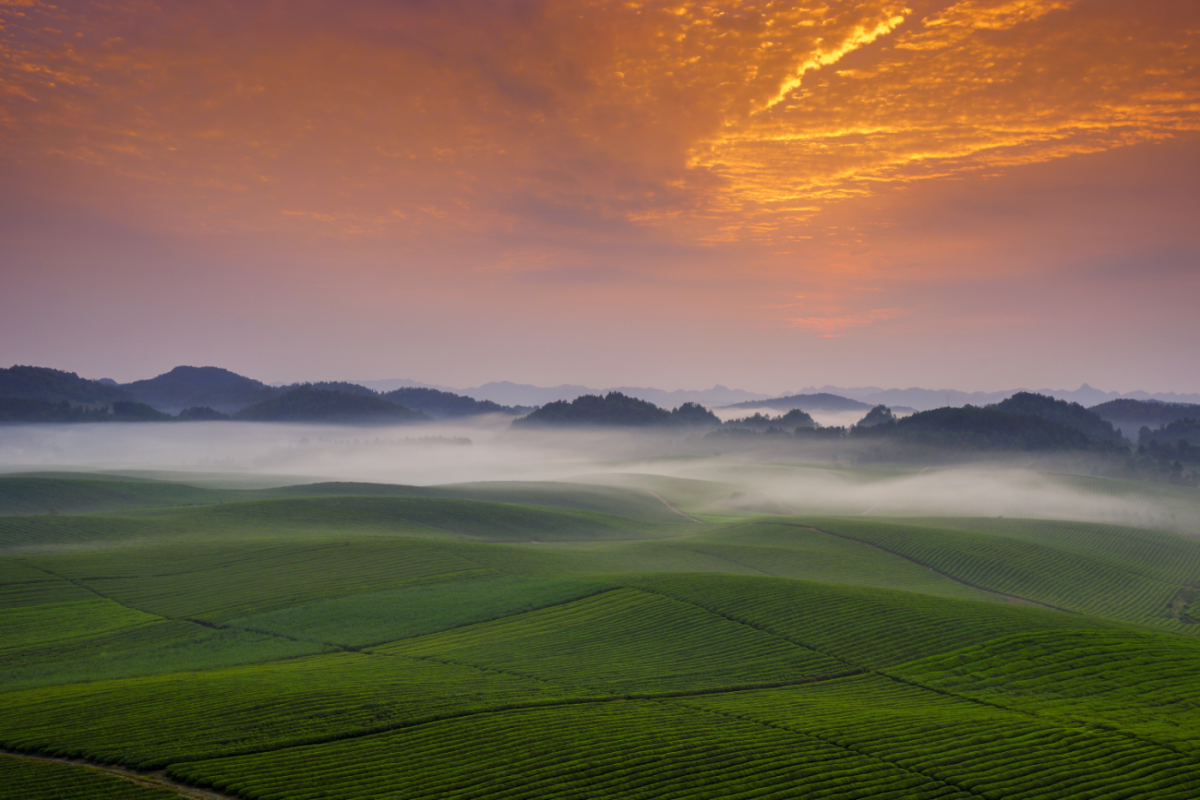
Meitan, formerly called Meijiang after the Mei River, was praised as a tribute tea. Today Meitan Cuiya green tea and Zunyihong black tea retain that reputation.
Meitan Cuiya is an early spring green oxidized for a few hours in the shade before processing. It is made from high-quality fresh and tender tea leaves and undergoes 20 complex processes, including spreading, fixing, shaping, and drying. The leaves appear straight and flat. The aroma is long-lasting above a bright green liquor. The tea has a fresh taste with abundant amino acids, polyphenols, and vitamins.
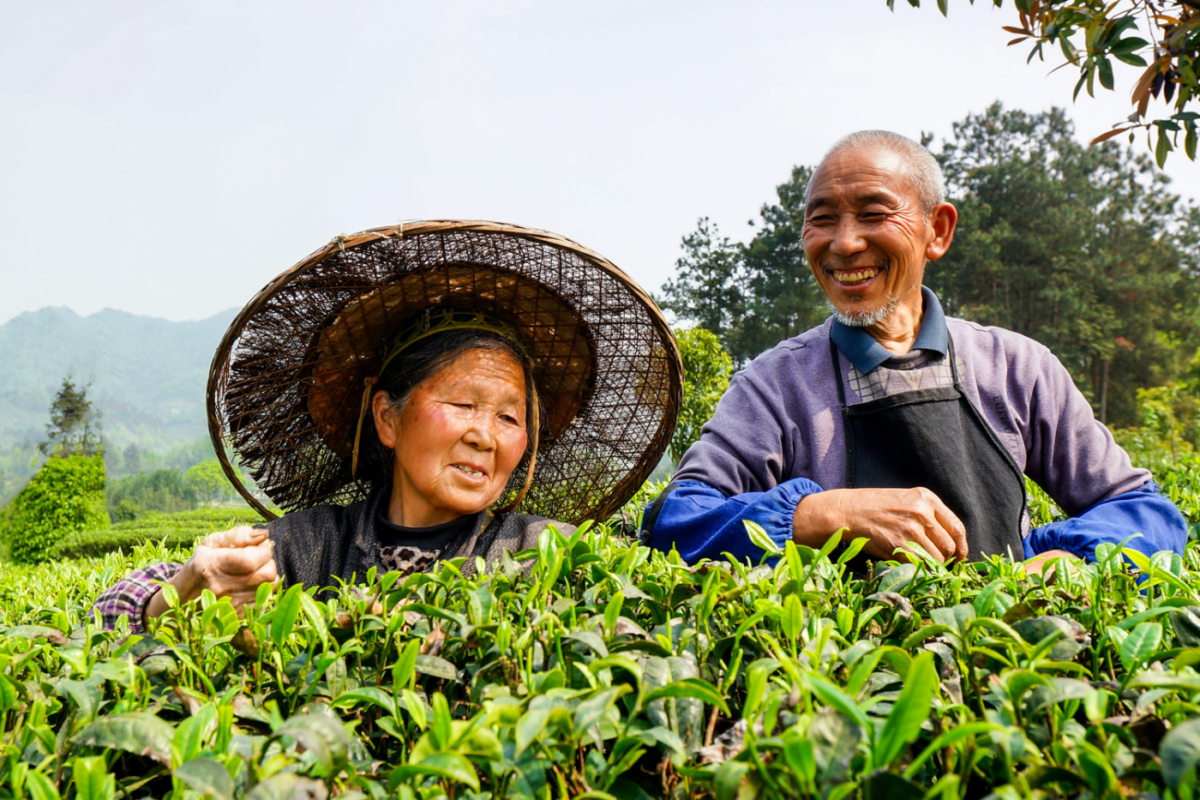
Zunyihong is a black tea with gold tints that produce transparent red liquor with a rich aroma and a long finish.
Cuiya and Zunyihong black tea are protected National Geographical Indications and listed in the “Three Green One Red” project as key brands in Guizhou province. Only teas are grown in Meitan, Fenggang, Yuquing, and Xisong counties, and Zunyi city can display the GI mark. Meitan Cuiya green tea has earned 88 national gold awards for tea quality. Zunyihong black tea has earned 28 national gold awards.
With great attention and strong support from governments, the tea industry has become the most critical pillar industry in Meitan county. From 2009 to 2017, Meitan won the title of “National Key Tea Producing County” successively. In 2015, it was called the “First tea county in Guizhou Province.” In 2016, it was named one of China’s top ten most beautiful tea villages.”
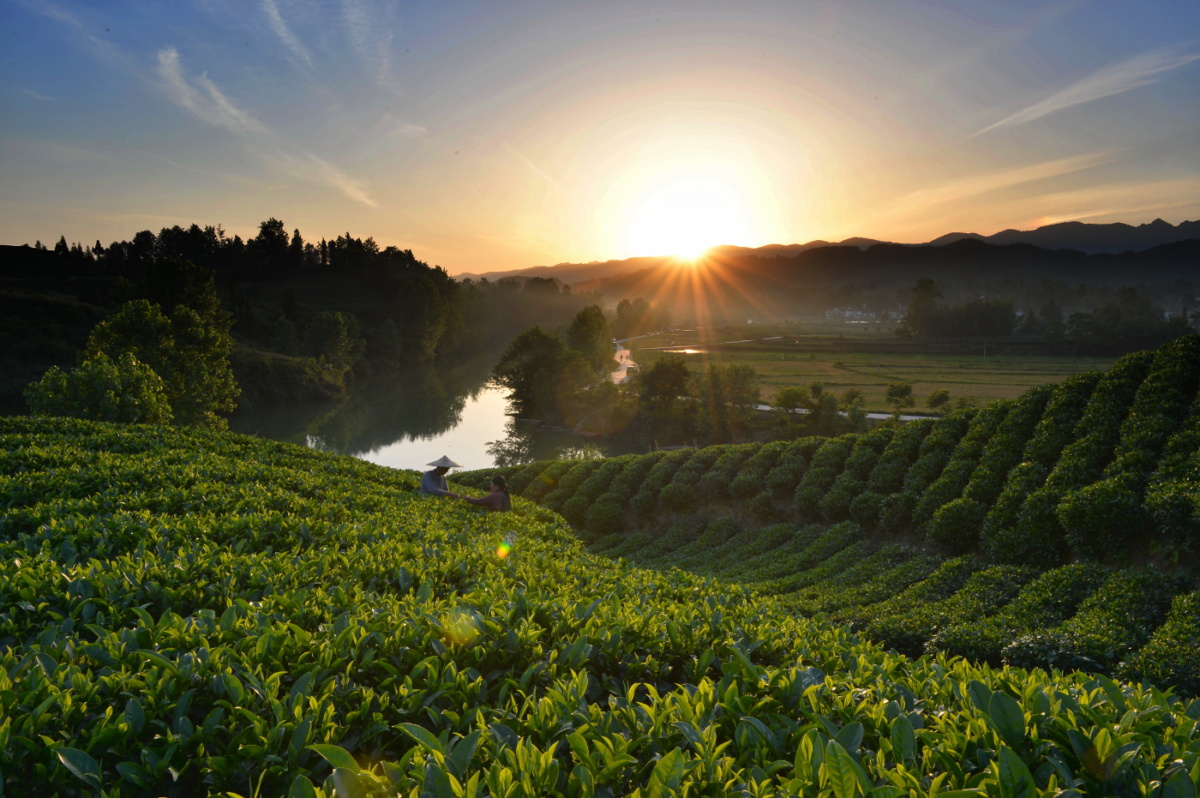
When you go
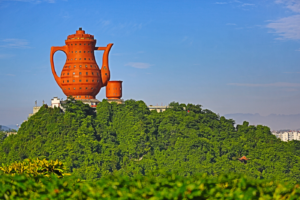 No one can miss seeing the World’s No.1 Teapot; a Guinness registered landmark. The 73.8-meter building, shaped like a teapot with a nearby cup, is Tianhu Park. There are 15 floors in this teapot with a diameter of 24 meters. The Tianhu Hotel occupies the first seven floors, and the 8th floor is a multi-functional conference hall. The 9th floor is for Tianhu painting and Calligraphy Academy, and the 10th floor is a Tea Tasting Hall and Tianhu sightseeing platform. Visitors will experience different kinds of tea cultures and drink all kinds of tea in this teapot – which, if filled, would hold 28 million liters of tea.
No one can miss seeing the World’s No.1 Teapot; a Guinness registered landmark. The 73.8-meter building, shaped like a teapot with a nearby cup, is Tianhu Park. There are 15 floors in this teapot with a diameter of 24 meters. The Tianhu Hotel occupies the first seven floors, and the 8th floor is a multi-functional conference hall. The 9th floor is for Tianhu painting and Calligraphy Academy, and the 10th floor is a Tea Tasting Hall and Tianhu sightseeing platform. Visitors will experience different kinds of tea cultures and drink all kinds of tea in this teapot – which, if filled, would hold 28 million liters of tea.
Website: (Chinese): Meitan County
Wikipedia: Meitan County
Tour information: Touring Meitan (Trip.Com)
China’s Tea Park is located in Meitan County. It is the largest tea park in the world, with a tea-producing area of nearly 2,867 hectares. The fresh air and strong tea fragrance gladden the heart and refresh the mind. The landscape in the park is primarily low hills. Tea plantation is in accordance with the trend of mountains. The park retains its historical memory and cultural connotations.
Meitan county also excavated more than 500 fascinating artifacts to protect its tea culture. The Guizhou Guizhou Tea Culture Ecological Museum and Chinese Tea Ceremony Hall centerpiece is an experimental tea farm and Guizhou Tea Industry Museum that opened in 2013.
Related: The Concept of the Ecomuseum and its Practice in China
The UNESCO Digital Library
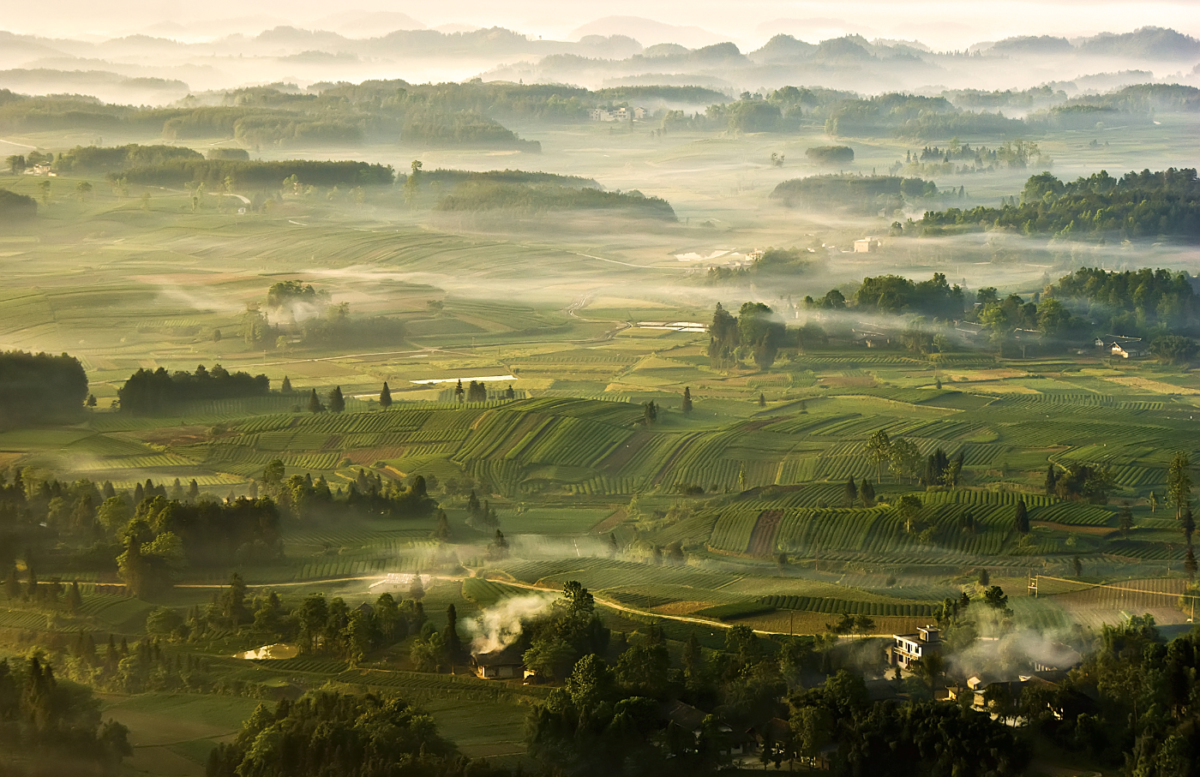
What a complex and fascinating tea. Very interested to know this green tea is oxidized for a few hours in the shade. I assume this would be considered withering?
Meitan Cuiya tea has 43 kinds of volatile compounds, among them, the predominant compounts were alcohols, esters, aldehydes, ketones, hydrocarbons and others, of which the major ones were ethanal (2.444%), methyl sulfide (5.264%), linalool (5.106%), trans-Geraniol (2.587%), dihydroactinidiolide (2.364%), hexadecane (3.605%) and caffeine (26.348%), according to researchers who completed a chemical analysis. Note the high percentage of caffeine.
A lovely tea story,
and very interesting desrciption of the Guizhou tea area;
would you let us have details about the local cultivars?
names, numbers , characteristics ? thank you !
Hi, I’m Sia from China Tea Marketing Association. you can contact with me by email yyj2188238@163.com, i can send you some informations about the Meitan tea companies. Do you want to buy some Chinese tea?
I would love to try this one now and get to know more about the region. Its history, processing and terroirs. I am CEO of Agência Porthia, Public Relations in Brazil, journalist and Tea Somellier.
Would you ship to Brazil? Thank you, gratitude Wei Peng.